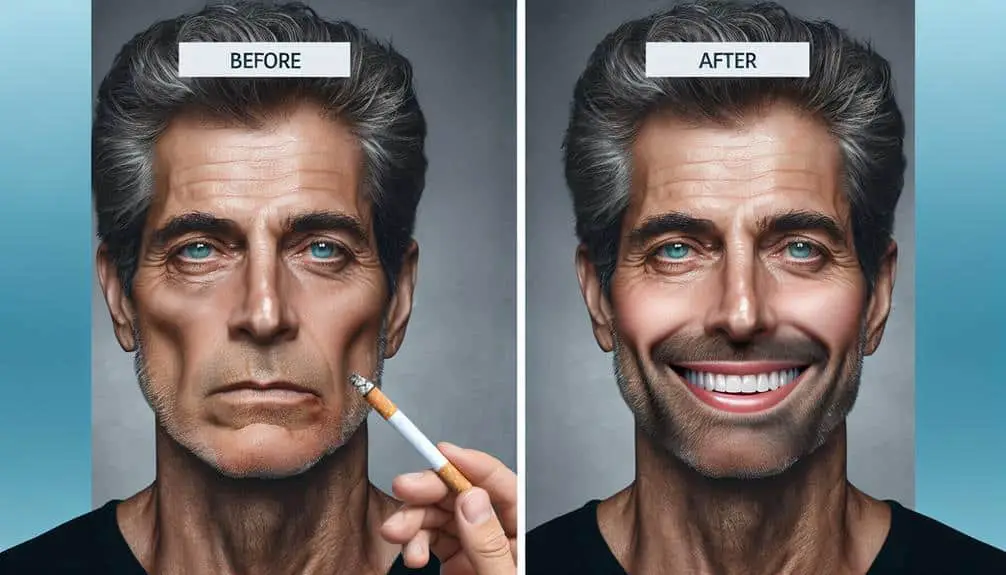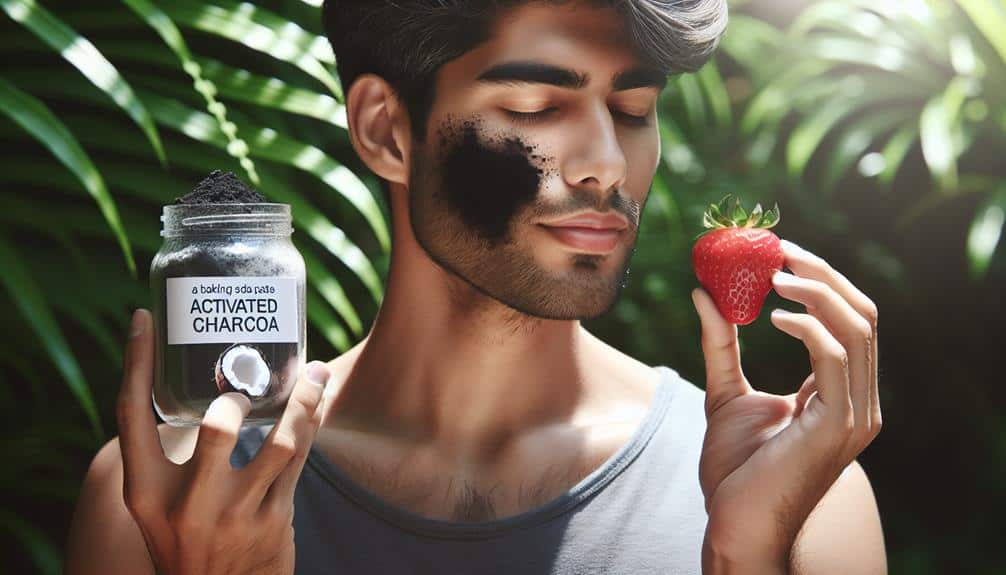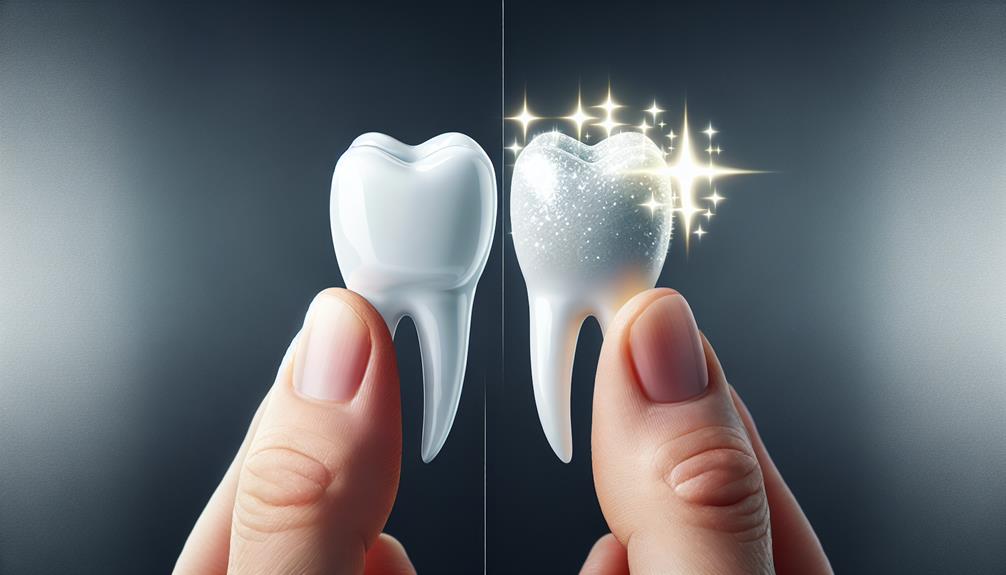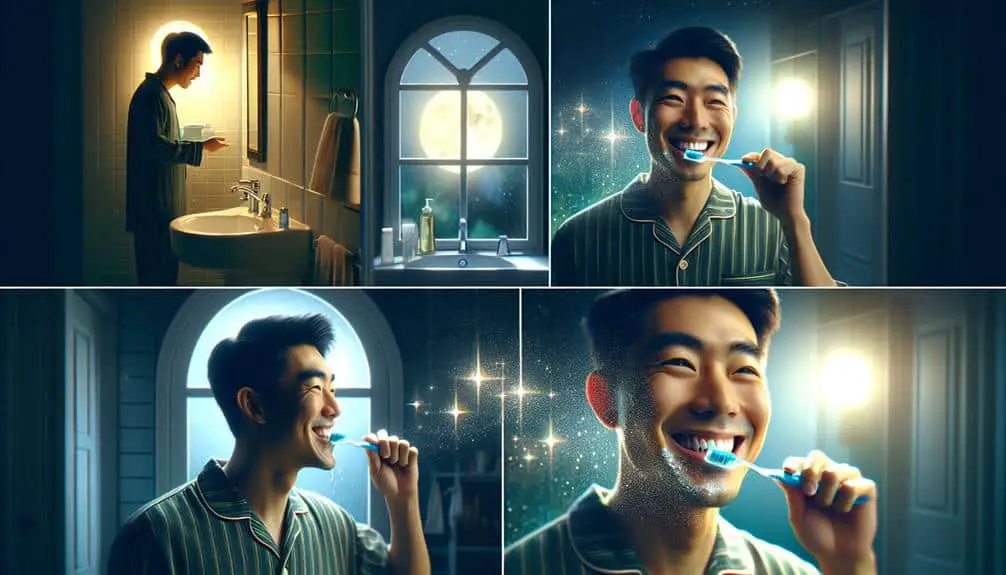For those looking to brighten their smile marred by smoking stains, consider professional teeth whitening services like whitening strips or laser treatments, both effective at removing stubborn discoloration. DIY remedies such as baking soda paste or natural solutions like activated charcoal can also help. Using ADA-approved whitening toothpaste and mouthwash can be beneficial, targeting hard-to-reach areas. Dental options like veneers or bonding offer longer-term solutions, while lifestyle changes, including reducing dark beverage intake and quitting smoking, can aid in achieving whiter teeth. Embrace these solutions to reclaim a brighter smile effortlessly.
Key Points
- Professional teeth whitening services effectively remove stubborn stains from smoking.
- Home remedies like DIY whitening kits and natural solutions help with teeth discoloration.
- Whitening toothpaste and mouthwash with peroxide aid in stain removal.
- Dental veneers and bonding offer long-lasting solutions for whitening teeth.
- Lifestyle changes such as diet modifications and quitting smoking improve teeth discoloration.
Professional Teeth Whitening Services
If you frequently seek professional teeth whitening services, you can effectively remove stubborn stains caused by smoking. Two popular methods used by dental professionals are teeth whitening strips and laser whitening treatments.
Teeth whitening strips are a common choice for those looking to brighten their smile. These strips are coated with a whitening gel containing hydrogen peroxide, which helps break down stains on the surface of your teeth. When used as directed by your dentist, teeth whitening strips can be an effective way to combat discoloration from smoking.
On the other hand, laser whitening treatments involve the use of a specialized light to activate a whitening solution applied to your teeth. This method is known for its quick results and ability to tackle tough stains, making it a popular choice for individuals seeking professional teeth whitening services for smoke-induced discoloration.
Both teeth whitening strips and laser whitening treatments can be beneficial in addressing stains caused by smoking when administered by a qualified dental professional.
Home Remedies for Stained Teeth
Explore natural remedies at home to combat teeth staining caused by smoking, offering effective and affordable solutions for a brighter smile. When dealing with stained teeth, consider trying out these home remedies:
- DIY Whitening Kits: Create your own whitening paste using baking soda and hydrogen peroxide. Mix these ingredients to form a paste, apply it to your teeth, leave it on for a few minutes, then rinse thoroughly. This can help reduce surface stains and brighten your smile.
- Natural Remedies: Use natural ingredients like activated charcoal, apple cider vinegar, or coconut oil pulling to help whiten your teeth. These natural remedies can be gentle yet effective in removing stains over time.
- Foods to Avoid, Habits to Change: Limit your intake of dark-colored beverages like coffee, tea, and red wine, as they can contribute to teeth staining. Additionally, quitting smoking and maintaining good oral hygiene habits can prevent further discoloration and promote a healthier smile.
Whitening Toothpaste and Mouthwash
Utilize whitening toothpaste and mouthwash to effectively combat stains and enhance the brightness of your smile. Whitening toothpaste typically contains gentle abrasives or polishing agents that help remove surface stains through thorough scrubbing. Additionally, these toothpaste varieties often include peroxide or other chemicals that aid in breaking down stains and lightening the color of your teeth over time. When selecting a whitening toothpaste, look for one with the American Dental Association (ADA) Seal of Acceptance for safe and effective stain removal.
Similarly, whitening mouthwashes can be a valuable addition to your oral care routine. These mouthwashes often contain hydrogen peroxide or other whitening agents that help to lighten stains on teeth. Mouthwashes can reach areas of the mouth that toothbrushes may miss, providing a more extensive whitening effect. In addition, following the instructions carefully is crucial to avoid overuse and potential side effects.
While these products can be effective in removing surface stains, deeper discoloration may require professional intervention. Natural remedies and DIY methods may complement the use of whitening toothpaste and mouthwash but are unlikely to provide the same level of effectiveness, especially for heavy staining.
Dental Veneers and Bonding Options
Consider dental veneers and bonding options as effective solutions for addressing stubborn teeth stains and achieving a brighter smile. Dental veneers are thin porcelain shells custom-made to cover the front surface of your teeth, effectively hiding discolorations and creating a uniform, white appearance. Bonding techniques involve applying a tooth-colored resin material to the surface of your teeth, covering stains and enhancing the overall look of your smile.
- Dental veneers offer a long-lasting solution for stubborn teeth stains.
- Bonding techniques are a more cost-effective option to improve teeth aesthetics.
- Both options provide visibly enhanced results and can significantly enhance the brightness of your smile.
When considering dental veneers or bonding, consult with a qualified dentist to determine the best option for your specific needs. These procedures can help you achieve a whiter smile and boost your confidence by addressing the stains that are resistant to traditional whitening methods.
Lifestyle Changes for Whiter Teeth
To achieve whiter teeth, implementing lifestyle changes such as modifying your diet and improving oral hygiene practices is essential. Dietary adjustments play an important role in teeth whitening. Consuming less coffee, tea, and red wine, which are known to stain teeth, can help maintain a brighter smile. Opting for crunchy fruits and vegetables like apples and carrots can also aid in removing surface stains. Additionally, drinking water after consuming pigmented foods can help prevent staining.
Improving oral hygiene is another key aspect. Brushing your teeth at least twice a day with a whitening toothpaste can help remove surface stains. Flossing daily is also important to remove plaque and prevent yellowing between teeth. Using a mouthwash can further aid in reducing bacteria that cause staining.
If you're a smoker, quitting smoking is one of the most impactful lifestyle changes you can make for whiter teeth. Smoking cessation not only benefits your overall health but also prevents further teeth discoloration. Combined with professional teeth whitening treatments, these lifestyle changes can help you achieve a brighter and healthier smile.
Frequently Asked Questions
Are There Any Specific Foods or Drinks That Should Be Avoided to Prevent Further Staining of Teeth?
To prevent further staining of your teeth, avoid foods and drinks like coffee, tea, red wine, and tobacco products. Incorporate dietary restrictions and make lifestyle changes. Maintain good oral hygiene by brushing and flossing regularly to preserve your smile.
How Long Do the Effects of Professional Teeth Whitening Services Typically Last?
On average, professional teeth whitening effects can last up to 6 months. To maintain long term effectiveness, avoid tobacco and dark-colored foods. Professional treatments yield quicker results but cost more; at-home options offer convenience at a lower price.
Can Teeth Whitening Products Cause Sensitivity or Damage to the Enamel?
To protect your enamel and prevent sensitivity, choose whitening products with enamel-safe ingredients like potassium nitrate. Opt for products that offer long-term results, minimizing the risk of enamel damage and sensitivity while achieving a brighter smile.
Is It Possible to Whiten Teeth That Have Been Discolored Due to Smoking for Many Years?
To whiten teeth discolored by smoking, consider professional treatments like laser whitening or at-home kits with peroxide. Natural remedies like baking soda can help maintain results. Boost self-esteem with a bright smile, akin to a radiant sunbeam.
Are There Any Alternative Treatments for Smokers Stained Teeth Besides the Ones Mentioned in the Article?
Looking to address smokers' stained teeth? Consider natural remedies like baking soda or activated charcoal alongside chemical treatments such as whitening toothpaste. Lifestyle changes, like quitting smoking, can also help, while dental procedures offer professional solutions.
Conclusion
To sum up, there are several effective solutions for smokers looking to whiten their stained teeth. Professional teeth whitening services, home remedies, whitening toothpaste, and lifestyle changes can all help improve the appearance of discolored teeth.
According to the American Dental Association, 82% of people believe that having a whiter smile can boost their confidence and overall success. It's important to consult with a dentist to determine the best whitening option for your specific needs.



